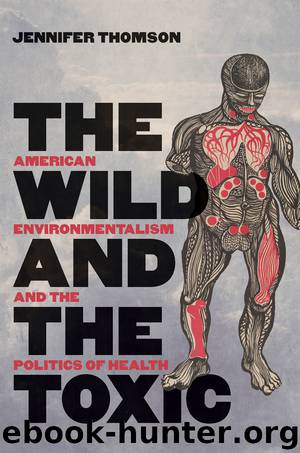The Wild and the Toxic by Thomson Jennifer;

Author:Thomson, Jennifer;
Language: eng
Format: epub
Publisher: University of North Carolina Press
Conclusion
This book opened by weaving together two claims. First, there is no way to think about our present environment without also thinking about health. Second, health and environmental activism have a tangled history that has been obscured and forgotten. As a result, health now functions within environmental politics as an empty signifier whose meanings and roots in historical struggles remain unexplored. Through four case studies of the late twentieth-century environmental politics of health, I traced the former conceptual and political richness of health and the outcomes for these divergent political actors as they navigated the changing waters of late twentieth-century political culture in the United States.
Friends of the Earth’s central contribution to environmentalism was to move from the Sierra Club’s exclusionary understanding of wilderness as a retreat within which certain individuals’ health could be regenerated to thinking of human health as a litmus test for the health of the environment. Although the more systemic and antiauthoritarian of these approaches faded by the early 1980s, others pertaining to consumption and individual health persisted within mainstream environmentalism. The result was a politics in which the primary subject position was held by an undifferentiated, globalized, non–place specific consumer in need of governmental protection yet also responsible for ensuring their own health through proper consumer choices.
Love Canal residents understood the health of the human body through an assemblage of epidemiology, toxicology, and personal experience. They perceived the individual as the marker of community health, environmental reality, scientific legitimacy, and government responsibility, in the process coming to see the entire world as environmentally vulnerable. Their conflicting interpretations of citizenship rights illustrated how they were torn between the conviction that everyone has the right to environmental health and the belief that the needs of national citizens should be prioritized.
Biocentrists’ dialogical connection of place with planet diverged from the global and abstracted environmentalism of national environmental organizations while also resisting the localism of antitoxics groups like the Love Canal Homeowners Association. Seeking to protect the health of the wild in a way that did not begin and end with human welfare, they developed interventions as varied as ecological restoration, land medicine, and reinhabitation. Their vision of the health of the wild held an aspiration for human-ecological integration in tension with pronounced antihumanist tendencies.
James Lovelock’s lifelong work on the Gaia hypothesis conceived of the earth as a single living entity whose health was threatened by human-induced changes in atmospheric composition and planetary biodiversity. Arguing that humans had overstepped their ecological niche, Lovelock developed a planetary medicine by which humans would treat the planet as a doctor would a sick patient. Gaia, as well as Lovelock’s diagnosis of the earth as having a fever, found renewed life in Bill McKibben’s call for drastic checks on the greenhouse gas emissions threatening the life of the planet.
Within twenty-first century environmental politics, health is commonly given two different expressions: human health as a marker of structural environmental oppression and the assertion that the planet has a fever. The former was poignantly illustrated by activism addressing the 2015 water crisis in Flint, Michigan.
Download
This site does not store any files on its server. We only index and link to content provided by other sites. Please contact the content providers to delete copyright contents if any and email us, we'll remove relevant links or contents immediately.
The Secret History by Donna Tartt(18157)
The Social Justice Warrior Handbook by Lisa De Pasquale(11951)
Thirteen Reasons Why by Jay Asher(8451)
This Is How You Lose Her by Junot Diaz(6434)
Weapons of Math Destruction by Cathy O'Neil(5828)
Zero to One by Peter Thiel(5488)
Beartown by Fredrik Backman(5350)
The Myth of the Strong Leader by Archie Brown(5237)
The Fire Next Time by James Baldwin(5016)
How Democracies Die by Steven Levitsky & Daniel Ziblatt(4952)
Promise Me, Dad by Joe Biden(4908)
Stone's Rules by Roger Stone(4854)
100 Deadly Skills by Clint Emerson(4688)
A Higher Loyalty: Truth, Lies, and Leadership by James Comey(4550)
Rise and Kill First by Ronen Bergman(4543)
Secrecy World by Jake Bernstein(4388)
The David Icke Guide to the Global Conspiracy (and how to end it) by David Icke(4377)
The Farm by Tom Rob Smith(4322)
The Doomsday Machine by Daniel Ellsberg(4243)
